HIT CHANNEL EXCLUSIVE INTERVIEW: March 2025. We had the great honor to talk with a very talented musician and producer: Chris Goss. He is most well-known as the guitarist, vocalist and founding member of the pioneers of desert rock, Masters of Reality. In the 2000s he also released two albums with Goon Moon. As a producer he has worked with Kyuss, Queens of the Stone Age, Mark Lanegan, Foo Fighters, The Cult, UNKLE, even Hollywood star Russell Crowe. Masters of Reality just released their first studio album in 16 years titled “The Archer” on Mascot Label Group. The album is available digitally since today, Friday 28 March and be available physically on CD & LP on 11 April. Read below the very interesting things he told us:
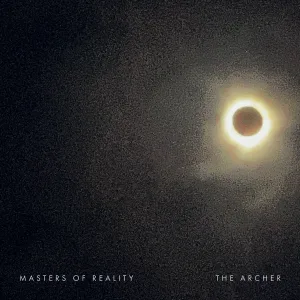 “The Archer” is the first Masters of Reality album in 16 years. Could you please give us some very basic info about the writing and recording process of “The Archer”?
“The Archer” is the first Masters of Reality album in 16 years. Could you please give us some very basic info about the writing and recording process of “The Archer”?
Well, I think in general art is a reflection of what the world gives the artist and the artist gives back. I don’t want to sound pretentious but in the last 15 years the world has gone through some very profound fast changes and I didn’t know what to give back to the world. I was watching and I didn’t find a muse to make me want to give anything back, I was mesmerized by what’s been going on, so, that’s why it took so long.
Why did you decide to call this album “The Archer”?
It fitted the solar eclipse, I believe, for the cover. A friend of mine took that picture and I had a different title in mind until I saw the picture. Then, I realized “The Archer” might fit that photo better than the other title. There are some mythologies about the archers firing arrows at the moon and the sun.
I love “I Had a Dream”. Please tell us everything we should know about this amazing composition.
Originally, it was a jam that we did when we were tracking and Paul (ed: Powell -bass) and John (ed: Leamy -drums) edited the jam and handed it to me and I finished it. Most of it, is little pieces of a series of dreams that I ‘ve had over the years and then I just jotted them down.
The guitar sound in “Chicken Little” is fantastic. How did it come about?
I’m not sure, it just happened. There are varieties of amplifiers and pedals and I can’t specifically tell you how, other than being recorded properly and having ears, I believe. The music for that track was done a few years back and I never put a vocal on it or any lead guitars or anything like that, so we pulled the old mix up that we had of it and I threw down some blues vocals on it. So, it was rather quick to finish that and I think it speaks a lot for shit that’s going on.
Let’s talk about “Mr. Tap ‘n’ Go”. Are you referring to an actual veterinarian or this song is a metaphor for those who try to control us?
Yeah, you can take it that way, if you like. I like people to interpret it the way they think and that always turns out best I believe, so, I think you are on the right track.
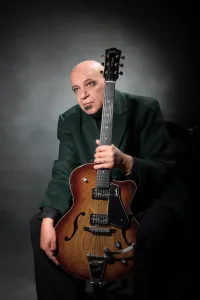
“Barstow” is very different from the other songs. What inspired you to write this?
I worked in Las Vegas a lot over the past 10-12 years and I love Las Vegas, I go there for fun, as well. The drive from Joshua Tree (ed: in California) to Las Vegas is all back roads through the Mojave Desert and that song came about from travelling from where I live to Las Vegas, usually by myself. Yeah, that’s it, it’s the desert. Barstow is a lonely desert town and it’s about people escaping, I think.
Was there any Doors influence on that?
It’s funny, people are asking that, all the time. I don’t think so, no. Not, in particular. I mean, if had been inspired to make it Doors-like I would have put reverb on the vocals and made it a little bit more mystical, I guess. Yeah, it’s funny you say that, three or four other journalists had said the same thing.
What do the lyrics of “Bible Head” mean? It sounds personal.
I don’t know, it’s up to you. I mean, I wrote those lyrics in like two minutes, what I call “automatic writing”, where you just let your hand go and don’t think (laughs) and that’s probably what it sounds thoughtless. So, yeah, once again, what you feel is more important than my little definition. It’s about feeling an emotion more than a literal translation.
What should fans expect from your upcoming European tour?
Masters of Reality, you know, what we do. If anyone hasn’t seen us, then, I hope that’s enough to bring them and people who have seen us before know what that means. So, we enjoy playing live and I hope we can get that sentiment back from the audience, as well.
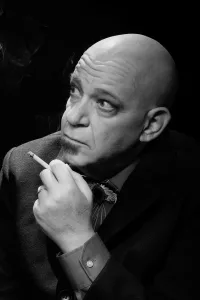
How much has your approach to songwriting changed over the years?
Interesting question. I don’t know if it has. It’s instinctual, every song is different and I approach everyone differently, I am not thinking a weird scale, I’m just thinking about the particular track. I mean, if you go through our records it’s hard to put us into any one category, I believe. This record isn’t as heavy sonic-wise, it’s less of a riff record that we have ever done, so, it’s just the product of the environment that it happened in the last 10-12 years.
Why aren’t you satisfied with Rick Rubin’s (Slayer, Metallica, Red Hot Chili Peppers, Johnny Cash) production on your first album (“Masters of Reality” -1989)?
The main reason is that’s not what we sounded like live, we were more goth live, darker and I always called it “the purple fog”. So, he took the whimsical bluesy part of us and made that the emphasis of the record. Although, that was a part us, it wasn’t the major part of us. I know people really enjoy that record, I wish it was a better snapshot of actually what we were at the time and that wasn’t so.
Are you proud that “Sunrise on the Sufferbus” is considered a classic album?
Yeah, I’m very proud of that. I’m very proud of the work with Ginger (ed:Baker -Cream drummer) . Yes.
Did you expect the commercial success of “She Got Me (When She Got Her Dress On)” single from “Sunrise on the Sufferbus”?
Yeah, it went Top-5 and at the time grunge was the thing and we put out a blues record basically, but I think that record was a good record. So, the song rocked and MTV really fucked us over on that, they said when the song hit #5 that we would be added at the time in “heavy rotation”, you know, that was the thing. The song went #5 and then the production people said that we looked too old and that was 30 fuckin’ years ago.
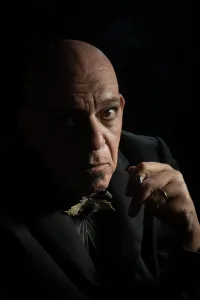
My favorite song from “Sunrise on the Sufferbus” is “Moon in Your Pocket”. What’s the story behind this?
I used to go camping by myself in a tent, in the summertime, in Upstate New York and I had a very scary experience: There was a large storm that broke out in the lake that I camped on, it was very high waves, it was like the ocean when I woke up in the morning. I went swimming and I got pulled in the undertow for quite a while and I thought I was gonna die, but I didn’t, I don’t think, unless this is all a dream. So, yeah, it’s about that.
How did you come up with the idea to ask Ginger Baker (Cream, Blind Faith -drums) to play on “Sunrise on the Sufferbus” (1992)?
Ginger and I had a very similar idea of what a groove was, so, it was a very mutual understanding of what a song entailed than what it needed. So, that was him playing and his style changed from the time he played in Cream to the time he played with us, it was a very different Ginger Baker, so, I went with it, you have to. I learned a lot from the motherfucker.
Was Ginger Baker an easy-going person to work with on “Sunrise on the Sufferbus”?
He was moody and you had to know when to approach him, when to talk to him. We got along very well, because I would sense that like: “Ok, today is not a good day to make him change the head on his snare (laughs). So, we ‘ll leave the snare head alone today because he’s not in the mood”. So, it was that kind of thing. If you knew Ginger, you would know how to approach him. Other than that, we got along very well, we stood up for each other all the time and he was a great bandmate for a while. We should have done three records together; it didn’t work out that way, though.
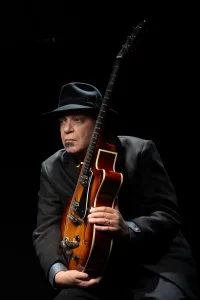
What was the reaction of the younger fans who wore Megadeth t-shirts when they saw Ginger Baker on stage during the tour with Alice in Chains?
So, you’ve heard these stories. We were put out on the road with Alice in Chains in ’93, I love Alice in Chains, but a lot of their crowd was very heavy metal-oriented and they didn’t know who Ginger was. It was sad to have this man who is an architect of what we do, to just don’t know who he was, but we did our best and some nights it worked really well and other times they just didn’t know who the fuck he was. I mean, that’s just ignorance and there is a lot of it around, so, it didn’t bother me.
Did you feel a lot of pressure to surpass the success of “Sunrise on the Sufferbus” when you did “Welcome to the Western Lodge” (1999)?
No, it was a completely different animal: Different time, different band. We did that in my own studio in Palm Springs and it was a whole different thing. I mean, the way “Western Lodge” is put together, I wanted to do a darker, messy version of Side two of “Abbey Road” (ed: The Beatles -1969) where the songs all clash into each other. By that time in my career I became frustrated with the music business and I think “It’s Shit” summarizes that all. Yeah, it’s a weird record, that’s for sure.
What turned you on to the music of Kyuss the first time you watched them live at a tiny LA bar?
I loved it, it was incredible. I knew they had something that was untouchable and no one else was doing it at that time. That’s why I stepped in and wanted to produced it, so, no other producer would ruin it, to make them get tight, because there was a lot of swing to it all that I loved, that I hadn’t heard in quite a few years. So, I was blown away. They were 17 years old and it was brilliant.
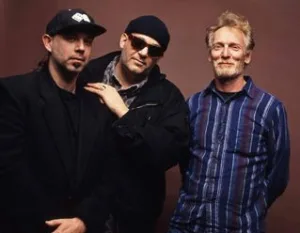 You are a great producer too. Who are your influences as a producer?
You are a great producer too. Who are your influences as a producer?
I think two main ones: Jimmy Page and George Martin (The Beatles producer) and they both have two completely different approaches to production. It has always been a combination of those two: Jimmy Page wanted a live feel and George Martin in The Beatles ended up doing a very animated feel. In the beginning, The Beatles had a very live sound, the early Beatles stuff, but then they became animated with “Sgt. Pepper” (1967), almost film-like in their production. So, both of those techniques; growing up with both of them and appreciating both of them, that’s what developed my brain, anyway.
Do you consider yourself as Kyuss’ George Martin (The Beatles producer)?
No. Everyone’s different. I don’t consider myself anybody except myself and I don’t even know about him. So, yeah, I don’t know (laughs).
I love Goon Moon’s “Licker’s Last Leg” (2007) album. What are your thoughts about this album nowadays?
I’m very proud of that record. That record should have been huge. I think it’s one of the best records that came out in the 2000s, to be honest with you and ignored pretty much. I’m glad you heard it, that’s what I like to say and I’m ecstatic with how that record turned out.
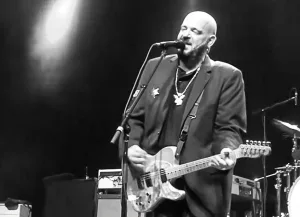 What’s the story behind “There Will Never Be a Better Time” with PJ Harvey from “Desert Sessions: Volume 9” (2003)?
What’s the story behind “There Will Never Be a Better Time” with PJ Harvey from “Desert Sessions: Volume 9” (2003)?
Well, I was playing guitar in the porch of the studio, just strumming some chords and PJ Harvey heard it and sat down next to me and just started jotting down lyrics. We said nothing to each other and I just kept playing this little pattern that I was playing and she said: “I like the way you play” and I said: “Oh, good, thanks”. So, she said: “I have some lyrics. Do you wanna give it a try?” and I said: “Ok, let’s go”. So, what you hear on that is the one and only take that we did of that song. We absolutely had no plan whatsoever. It was completely improvised and she had the lyrics in her hand, on a notebook, that were done in minutes and the intro and outro, everything was just made by feel. Another moment that I’m very proud of, yeah.
What have you discovered after all these years interested in occult?
There is duality, you know: The bright side of life and the dark side of life and what created those different shades, the light and dark and how it all works. That drew me into that for a while. It was very interesting and the art that it made was very interesting, as well, tapping into the different parts of your psyche. It opened up different areas and doors to walk through. So, that’s what drew me to it.
Was it an interesting experience to produce Russell Crowe on 30 Odd Foot of Grunt’s “Gaslight” (1998) album?
Yeah, “interesting” is probably the word. It was fun, he was a good guy. He called me in the studio, I didn’t know who he was when he first called; he wasn’t the huge star yet. So, he treated me very kindly and I did my best. We got on quite well, yeah.
What was it like to grow up in ‘70s New York?
It was wonderful: Punk rock downtown and disco uptown and I love both kinds of music. It was so exciting; the electricity in the air in New York in the ‘70s is unmatched to this day. Standing in front of CBGB’s or Max’s (ed: Kansas City) or Studio 54 or Xenon, wherever you went, it was exciting. Maybe that because I was younger, I don’t know. But I think it really did exist and everyone I know who lived through it and survived, thinks it existed, as well. So, yeah, that’s my feeling. Maybe it was the last breath of innocence, in a way, before rock became corporate.
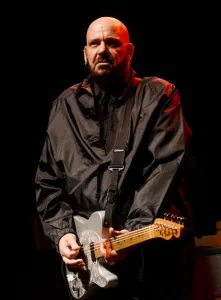 Do you have an explanation why nowadays is it considered cool to say “I like Kiss or Rush” and it is considered uncool to say “I like Fairport Convention or Soft Machine or The Doors”?
Do you have an explanation why nowadays is it considered cool to say “I like Kiss or Rush” and it is considered uncool to say “I like Fairport Convention or Soft Machine or The Doors”?
Those are people’s hang-ups, you know. If you listen to 1970’s prog music, if you can’t find beauty in a lot of it, then, you are dumb. There are passages of music in prog and jazz fusion that people frowned upon for quite a while. I never stopped liking anything that I love, so, even when I became a punk rocker, I still I held on to my Yes records. Then, years later I talked to Keith Levene (ed: guitarist, keyboardist and founding member of The Clash) from Public Image Ltd and he loved Yes, as well. At the time, when you were a punk, it was cool to put down Yes as a dinosaur prog rock band and King Crimson, anyone who could play and I still to this day can’t play that kind of music. I never had the discipline to practice scales on guitar. I learned by playing along with rock ‘n’ roll records, so, to this day, I can’t play a major scale without making a mistake. But people who did have that discipline and could transform it into well-arranged beautiful passages of music, I’ve never lost my respect for them. Even Jimmy Page and I, both agree that Steve Howe (Yes) is the greatest guitar player ever. So, yeah, respect is what is about and having an open mind and knowing great music when you hear it and not being such an ideological, trendy asshole that changes their mind every five years on what they like. The British are notorious for that, like, they put you in the pedestal for five years, then knock you off the pedestal. So, I tend to be more respectful and hang on to what I like because I know it’s good in my heart.
Do you think because of the streaming services listening to an album from start to finish is now becoming a kind of lost art?
Yes, it’s very unfortunate. People’s attention spans have gone to shit and there is too much music being thrown to everybody online. Thank God, for fans who still want to hear an album. It’s hard for me to get turned on do a new band and get through a whole album, unless it just tugs at me and forces me in a weird way. So, I get it, in a way and I’m repulsed by, in a way. Yeah, it’s definitely fucked things up.
You look like Captain Beefheart nowadays. Are you a fan of his?
(Laughs) Yes, very much. Especially his lyrics.
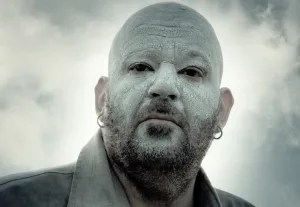 Why it took you 20 years to finish “Brown House on the Green Road” from “Give Us Barabbas” (2004) album?
Why it took you 20 years to finish “Brown House on the Green Road” from “Give Us Barabbas” (2004) album?
I don’t know. Over the years, that song just kept being put on the back burner. Even when we were recording the record with Rick Rubin, I had that song and he liked it; the rest of the band didn’t like it. It was just a matter of timing and “Ok, I have a band who gets it” when we finally did record it. Yeah, it was just a matter of waiting for a band that understood it and wanted to play it.
How helpful was William Styron’s “Darkness Visible” book to overcome your depression?
It’s a temporary relief. Depression comes and goes and I think his book helped me at the time, with that message in mind: “You gotta to ride it out for a while. Don’t give up because eventually the darkness lifts. So, stick around as long as you can because life goes by very quickly, anyway”. So, by the time you’ve not killed yourself, life is over, anyway (laughs).
Is there still room for experimentation in desert rock?
Oh, yeah! I think the new record proves that. It’s up to the individual, the musician, to take it wherever he wants. You have to make music that you wanna hear, that your brain is longing to hear and that’s what I hope everybody does. Don’t look at your neighbor and see what they are doing, make your own world. That’s what makes us as artists individuals whether it works or not commercially or whatever. I mean, I’m used to putting out some really good records that get very little commercial success. So, what else is new, uh?
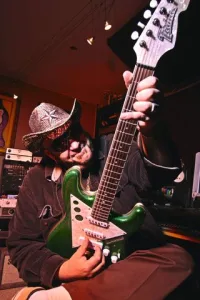 Are you optimistic about the future of desert rock?
Are you optimistic about the future of desert rock?
It’s funny, it’s a genre of music that made its way into all the other genres of music around the world. Even working with UNKLE and electronic music, there is a certain sensibility of guitar groove, I think it’s the main thing. I don’t know if it’s optimism or pessimism, it sank in, let’s put it that way. So, I guess that’s optimism.
Was it intriguing for you do redo Jethro Tull’s “Aqualung” for “Aqualung Redux” (2024) album?
I was asked to do that by Alain Johannes (guitar), because he’s been asked by another label, so yeah, it was very easy for me. Alain did all the main Russian-style men’s choral vocals in the background and I just had to sing the lead vocal which I was very familiar with over the years. That was a song from my youth that was very important, so, it was easy.
Jimi Hendrix’s music, Santana’s music, George Harrison’s music had also a strong spiritual aspect. Is today’s music spiritual?
That’s a good question. Most of it, it is not. When you hear divinely inspired melody, you know it and I don’t hear much divinely inspired melody. I mean, Jeff Buckley was great and there are bands, especially some gospel bands or gospel singers that are still doing well. But as far as pop music, no. No, I don’t hear much spirituality in it, at all.
Would you like to tell us a few words about your friend Mark Lanegan who passed away in 2022?
Yeah, Mark was a genius and the more you listen to it, the more you miss him. That’s it. I was proud to work with him.
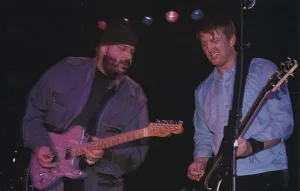 Were you a bit jealous when Josh Homme (Kyuss, Queens of a Stone Age -guitar, vocals) formed Them Crooked Vultures with John Paul Jones (Led Zeppelin -bass, keyboards)?
Were you a bit jealous when Josh Homme (Kyuss, Queens of a Stone Age -guitar, vocals) formed Them Crooked Vultures with John Paul Jones (Led Zeppelin -bass, keyboards)?
The only thing that bothered me is he never told me about it and I heard it through other people: “Jones is playing with Homme and Grohl (ed: Foo Fighters singer/guitarist and Nirvana drummer)” and Josh knowing what a Zeppelin fan I was, never even told me. So, it wasn’t jealousy, it was just the maddening ignorance and fear, I think, of having me around.
Do you like newer bands like Truckfighters and All Them Witches?
I’m not familiar with either of them. I’ve heard of them but I haven’t listened to them yet. Are they good?
I think Truckfighters are better. Even Josh Homme featured in their documentary (“Truckfighters” -2011).
Oh, well. Good for him.
Do you like folk stuff like Townes Van Zandt or Nick Drake?
No. It doesn’t draw me in, no.
A huge “THANK YOU” to Mr. Chris Goss for his time. I should also thank Lee Puddefoot and Lauren Schuller for their valuable help.
Main photo: Alex Solca
Official Masters of Reality website: https://mastersofreality.com/
Official Masters of Reality Facebook page: https://www.facebook.com/mastersofreality

